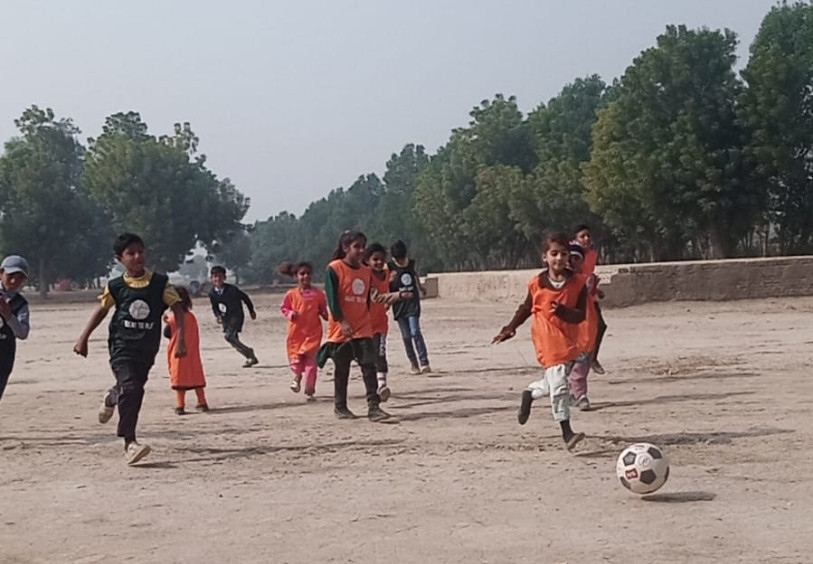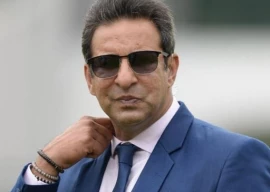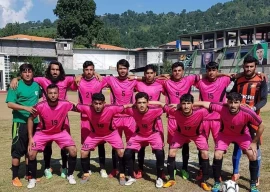
Innocence gives birth to creativity and the joy in the eyes of the eighth grader Tasleem Junejo says it all as she, among 200 other children, played football for the first time in the village of Majeed Keerio.
Football maybe world’s most watched and adored sport, but the children and even adults in Sakrand Taluka including Tasleem are not among them.
“I love this, this is so easy, I have never seen this before. I love the feel of the football in my feet,” Tasleem told The Express Tribune, with a smile playing on her face, after a good session of warm-up exercises and first taste of kicking the football.
“I only knew a little about cricket,” she confesses as she and her sister Momal Junejo, along with sixth grader Sindhu Lakho and Alishba Arain, looked happy to be playing, as their mothers looked on.
Tasleem was clad in blue and red and wearing fake glasses with shoes that were not meant to be used for playing any sport at all. In fact she was wearing sandals, but that is the case with most of the children that showed up on November 13 in Sakrand Taluka.
This was the first time the teachers of the Syed Imdad Muhammad Shah (SIMS) English Medium Elementary School ran by Imdad Foundation, along with students from two other schools looked at the beautiful game.
The initiative was a result of Diya FC and the SIMS School Director Tabassum Khoso who came up with the idea of empowering girls and women and starting the sports and life skills programme that is meant to take a shape of an academy for the children of Majeed Keerio Union Council.
The aim is to build the community which has empowered youth that can have access and means to survive in the world beyond Sakrand, where one sees solar panels on every street and in the fields.
By every measure, women’s football is taking roots in interior Sindh and especially now in Majeed Keerio.
Before the fateful Saturday, they had never touched the ball, never knew what “one touch and kick” meant.
The mothers looked at their girls and boys as they tried to comprehend what the sport was about after all.
“What will happen if my daughter plays football?” Naseem Khatoon, Tasleem’s mother asked with curiosity and admitting that it all depends on her husband’s will whether there should be a football in their household. Meanwhile, Tasleem looked inquisitively, “What will happen if I play football? Will it change my life?”

Starting a revolution
Tasleem’s enthusiasm along with other children, including boys was evident. With Naseem Khatoon stood Menghi, a woman who was in the ground with her sons, she hoped to see her boys take control on the field.
“I have never seen anything like football before, but maybe my son can become good at it,” said Menghi. She wants to have her children play, but she does not want her daughters in the ground. That alone is a challenge that Khoso and her team, along with the chairman of the school Professor Inam Bhatti and teachers Rimsha Keerio and Sanam Baloch will be facing now.
The inaugural session of the programme that had Tasleem along with other girls was a success, but also posed a challenge. In the evening session Tasleem and her sister were not around.
“We will need to convince the parents,” Khoso explains as Diya FC Founder Sadia Sheikh, her coach Naila Sheikh and Pakistan junior international players Zunaira Shah and Marium Zehri had been training the children, while picking up on the talented ones in the first session and using the equipment provided by Right To Play.
The enrolment in the program required the participants to pay a nominal fee as well, but mostly Sheikh said that the talented players should be supported on all accounts.
“We need to explain it to the families, and that is the change we need to see, the change we need to bring. We can’t just force them to send the girls to the ground. We need to show them that they can trust us and football is the way to learn life skills as well.
“In our villages the girls and their role is set that they need to get married, which is a very traditional and limiting pattern there. We need to change this and it is possible with football,” said Khoso, as Bhatti had also tried to explain to the crowd at the inauguration that he wants to see girls and boys from Majeed Keerio and Nawabshah to play football internationally.
For Sheikh the battle is to bring confidence in the children, especially the girls. “I try to encourage the girls more because the parents in the society have no problem in investing money and resources when it comes to the boys, but they do hold back when it comes to the girls. In Majeed Keerio, the aim is to give the children, especially the girls that confidence. In fact I have seen the talent here, there is so much potential and we can have players for our team to play abroad from here as well, just like we had girls from Thar.
“At the end of the day these children deserve a good story that they can tell and remember and experience it so that the next the ones, who will come after them, can also take inspiration. We need to give the children the opportunity to set examples in sports.”
Shiekh added that while girls need care, even the boys in the first weekend of the programme seemed to have lacked in self-confidence, therefore the initial sessions will be dedicated to playing in the field freely and without fear, but with awareness.
Mostly the players in Sindh do come from Karachi and the cultural difference in sports is stark, but what the villages in Nawabshah lacked in is infrastructure and expertise. However, they made up for it with enthusiasm and curiosity.
“I am excited and I am just astounded by football,” said Laila Jalbani who earned her masters’ degree in chemical engineering and now teaches at Sindh Education Foundation School.
“I never played a sport before this. I only knew about cricket, but I am so surprised. I really feel the love for this sport,” she added.
Like her, Sanam Baloch showed immense talent despite never playing football before, and as a teacher she feels she can motivate her students to excel in sports.
“I love athletic activities. I run fast and I think I’m good at cricket too, but football is definitely a more engaging sport for me as I am discovering it,” said Baloch, who had been a part of SIMS School, which is run solely by female staffers.
But with a new sport at hand, Zehri feels that in the second week that coincided with the World Children’s Day, the improvement is visible.
“I’m so happy to see that the participants, especially the children, they are now understanding the terms and even our language too as we go into the second week. I am having the best time playing and teaching them,” said the Pakistan junior player as the aim is to bring more footballing talent out of Nawabshah that can redefine the meaning of life, education and sports for the youth and bring more diversity to the national pool of players who can represent the country in the future.
“But Tasleem has not made it to the training sessions after the first day,” said Zehri, a confirmation that playing sports is a right that is denied on many levels, but with the collective effort, change can take place





1720005904-0/BeFunky-collage-(53)1720005904-0-270x192.webp)





1633166116-0/Nuts-(19)1633166116-0-270x192.webp)

1630402578-0/Nuts-(18)1630402578-0-270x192.webp)






COMMENTS
Comments are moderated and generally will be posted if they are on-topic and not abusive.
For more information, please see our Comments FAQ